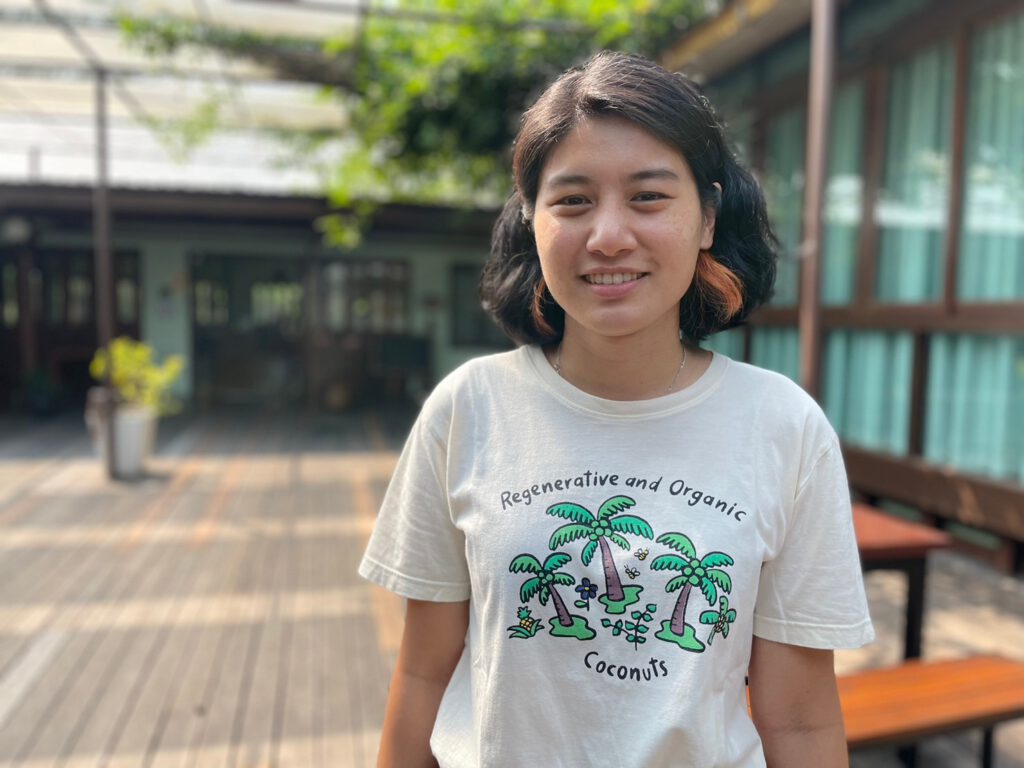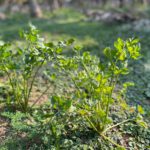It has been two years since Chananya Chawengchote left behind her career as a chef overseas and returned home to take care of her 85-year-old father and 35-rai plot of coconut orchard in Ratchaburi province.
Ms Chananya, or Kung as called by her family and friends, grew up here. As a second generation coconut grower, she always wants to keep the orchard sustainably productive yet labour non-intensive and consumer-safe, all while facing saline intrusion, soil degradation, pest invasion and climate change. When her family’s orchard was destroyed by coconut black-headed caterpillar in 2021, she did not hesitate to seek a solution to coconut farming management.

The chef-turned-coconut farmer was introduced to the Regenerative Coconut Agriculture Project (ReCAP) in mid-2021. She is among 400 farmers participating in the trainings on how to transform conventional farming towards regenerative organic coconut practices. The aim is to reduce the impact on climate change restore soil and farm ecosystems and strengthen the livelihoods of farmers and local coconut farming communities.
Ms Chananya quickly learned that planting cover crops such as roundleaf bindweed, or Bai Tang Rian in Thai, could reduce soil erosion and improve soil moisture holding capacity. Such technique is unlike the conventional practice. The older generations of coconut growers believed all kinds of cover plants were weeds and should be pulled off from the soil surface to ensure that they would not compete for nutrients, water, and light.

“I never thought that some weed would not only improve moisture and soil health, but also boost our livelihoods,” she said, adding that a sack of roundleaf bindweed can be sold at 200 baht.

As one of the ReCAP farmers, Ms Chananya also plans to manage her coconut farming in a more sustainable way to prepare her farm for exporting market opportunities for her coconut produce.
“Thanks to ReCAP Project, I am exposed to practical farming methods that can transform and take to our coconut farming to the next level, to be competitive and meet international standards. If we take good care of the coconut farm, then the coconut farm will be resilient and sustainably take care of us,” she said.
Zero-waste management

Charuwat Hongsuphagphan is a second generation coconut farmer turned wholesaler. Every day he and his workers have to deal with tonnes of shells and husks considered waste.
After joining a four-day training programme run by the project, he learned how to put into practice compost making from coconut waste by mixing husks, chopped coconut shells and chicken feces.
By reducing the use of chemical waste and producing compost fertiliser for use at his family’s 14 rai coconut land plot, he could help his family reduce the fertiliser cost by up to 50,000 baht per crop cycle.

“The project seeks creative ways of transforming coconut waste into economically and environmentally sustainable products,” he said.
Currently, coconut from his farm is certified by the US Department of Agriculture (USDA) as organic. Mr Charuwat said he also planned to transition his farm to meet the Regenerative Organic Certified (ROC) standard, regarded as a new holistic standard raising the bar for how food is produced. ROC uses the USDA Organic standard as a baseline. From there, it adds important criteria and benchmarks that incorporate the major pillars of regenerative organic agriculture into one certification. The goal of ROC is to promote holistic agriculture practices, increase soil organic matter over time, and sequester carbon below and above ground, which could be a tool to mitigate climate change. He hopes to provide economic stability to his farm and workers with these efforts.
“International standards will boost competitiveness of our coconuts and open more market opportunities, with the competitiveness situation we are facing, we have to always seek market opportunities and improve our farming management and our products,” he said.
Responsible business

Khachiphan Bunsiri, Sustainability Manager of Harmless Harvest Thailand, said partnering with the project enabled the company to follow its mission to bring positive impact to the environment and the farming communities in which it operates. Currently, the Company products are certified USDA organic and Fair for Life and Harmless Harvest is on its way to have Regenerative Organic Certification (ROC). The Company actively promotes regenerative organic agriculture among coconut farmers and ReCAP is one of its strategies.
“To convince farmers to adopt regenerative agriculture practices, we cannot do it alone. It also takes time to work and align with all stakeholders in the coconut supply chain to bring social change,” she said.

The ReCAP project provided a platform for the private sector to share expertise and introduce consumer trends that are essential for Thai coconut industry to adopt. The project enhances smallholders’ sustainable farming practices and farm management skills while engaging government and academic sectors to international organic standards and most importantly consumers’ needs.
Nowadays, consumers are much concerned about health and environmental impact. Manufacturers give priorities to ingredients and products that are responsibly sourced, organic, and fair trade since these factors could boost competitiveness.

Three years of project implementation have led to an awareness of business models among coconut farmers. Ms Chananya and Mr Charuwat are proven successful in putting regenerative coconut agriculture into practice. Over 400 coconut farmers and entrepreneurs in the implemented area are trained on regenerative coconut agriculture.
Lisa Faust, ReCAP Project Manager, said further discussion with stakeholders on how the results of the ReCAP project can be sustained long-term, including the knowledge and equipment transfer to local coconut communities, are ongoing as part of the project’s exit strategy. ■















